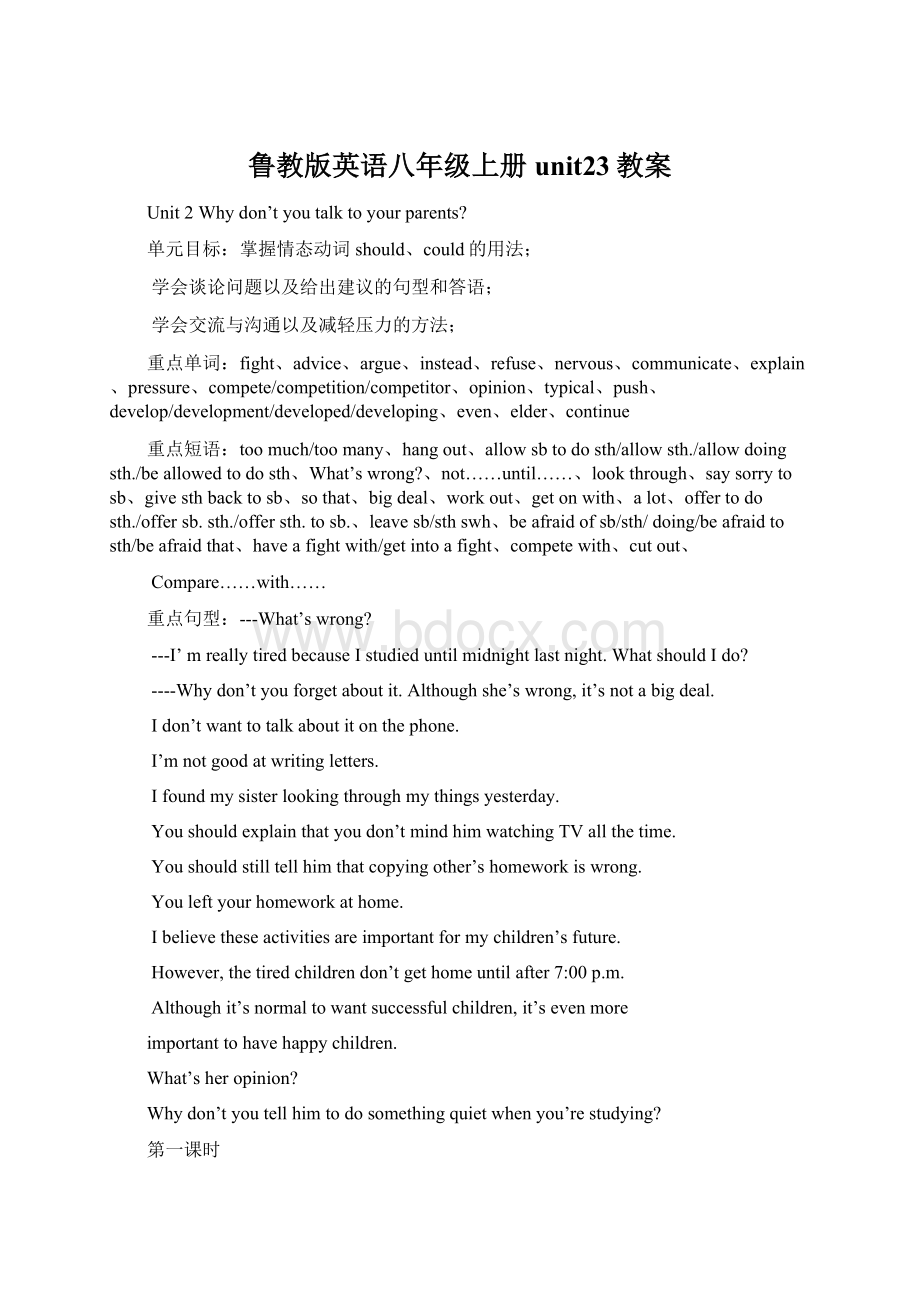鲁教版英语八年级上册unit23教案Word格式.docx
《鲁教版英语八年级上册unit23教案Word格式.docx》由会员分享,可在线阅读,更多相关《鲁教版英语八年级上册unit23教案Word格式.docx(23页珍藏版)》请在冰豆网上搜索。

Althoughit’snormaltowantsuccessfulchildren,it’sevenmore
importanttohavehappychildren.
What’sheropinion?
Whydon’tyoutellhimtodosomethingquietwhenyou’restudying?
第一课时
(SectionA1a-2d)
一、教学目标
1、知识目标:
掌握重点单词sleep、allow、find、deal;
重点短语toomuch/toomany/muchtoo、getintoafight、callup、talkto、lookthrough、givebackto、sothat/although/until、workout
2、技能目标:
能听懂有关介绍他人或自己问题的对话;
能描述生活中遇到的问题
3、情感价值目标:
学会遇到问题主动去和家人和朋友交流
二、教学重点与难点
1、掌握询问他人情况的句型、表达遇到的困扰和问题、以及提出建议的句型
2、区分toomuch、muchtoo、toomany的用法
3、掌握find的用法
三、教学设计
1、新课导入。
学习以及生活中我们都会遇到很多困扰,在学习和生活中我们会遇到哪些困扰呢?
当我们或者周围的亲人、朋友遇到困扰时,我们应该如何提出合理的建议来帮助自己或者他人解决问题呢?
(1)Lookat1aandwritethemintheappropriatebox.
(2)重点短语
studytoomuch_________enoughsleep______
Toomuchhomework______hangout___________
Toomanyafter-schoolclasses______allowsbtodosth______
2、假如你的朋友看上去很难过,你该如何询问他最近的情况,她/他有可能遇到哪些困扰,你又该如何提出合理的建议帮她/他走出困境、摆脱困扰?
(1)如何询问他人的近况?
What’swrong?
What’sthematter/trouble?
What’swrongwithsb?
What’sthematter/troublewithsb?
Whathappened?
(2)生活或者学习中可能会遇到的问题
IhavetostudytoomuchsoIdon’tgetenoughsleep.
IhavetoomuchhomeworksoIdon’thaveanyfreetimetodothingsIlike.
Ihadafightwithmybestfriend.
(3)向他人提出合理的建议
Ithinkyoushould+动词原形
Whatabout/Howabout+名词、代词、动名词“……怎么样”
Whynot+动词原形/Whydon’tyou+动词原形……“为什么不……”
Let’s+动词原形
ShallI/we……“我/我们……好吗”
You’dbetter(not)+动词原形“你最好(不)……”
Wouldyouminddoing……“你介意做某事吗”
随堂练习:
用所给动词的适当形式填空
1)Howabout_________(go)outforsupperthisevening?
2)Whynot___________(buy)ahandbagforher?
3)---Shallwe________(go)tothezoo?
---Allright.
4)Whynot________(get)acamera?
5)Whatabout________(watch)TV?
6)Let’s_____________(have)lunchtogether?
单项选择
1)______gotoaskapolicemanforhelp?
A.Whydon’tyouB.Whynotyou
C.Whydidn’tyouD.Howabout
2)---Whataboutgoingswimmingwithmethisafternoon?
---_______,butIhavemuchhomeworktodo.
A.I’dlovetoB.Yes,Let’sgo
C.No,Iwon’tD.Itdoesn’tmatter
3)Why_________withme?
A.comeB.comes
C.notcomeD.notcoming
4)---Whydon’tyou_____acamera?
---That’stoocheap.
A.gotB.getC.getsD.getting
5)---Whynotcomeandjoinusinthegame?
---____.ButImustgotomeetMr.Smithattheairport.
A.I’dliketoB.Let’sgo
C.Yes,pleaseD.It’sapleasure
3、要点全解
1)toomuch/muchtoo/toomany
toomuch“太多”。
修饰不可数名词,置于名词之前;
也可以修饰动词,放在动词后面。
muchtoo“太”,修饰形容词或副词原级,表示程度。
toomany“太多”,修饰可数名词复数.
Ihavetoomuchhomeworktodoeveryday.
Thedoctortoldhernottodrinktoomuch.
Theworkismuchtoohardforme.
Themathproblemismuchtoodifficultforme.
Therearetoomanypeopleinthepark.
2)sleep不可数名词,“睡觉,睡眠”
不及物动词(slept/slept)“睡觉”
Weneedatleasteighthours’sleepeveryday.
Ididn’tsleepwelllastnight.
Shegoestosleepatnineo’clockeverynight.
3)allow“允许”
allowsbtodosth“允许某人做某事”
allowsth.“允许某事”
allowdoingsth.“允许做某事”
beallowedtodosth.“被允许做某事”
Ican’tallowyoutotalktoMomlikethat.
Thedoctorallowedhimtotakeashortwalkeveryday.
Parentsshouldallowtheirchildrentodothingsthattheylike.
Childrenshouldbeallowedtodothingsthattheylike.
Thelawdoesn’tallowsuchanaction.
Wedon’tallowsmokinginourhouse.
4)until此处用作介词“直到……为止”,其谓语动词必须是延续性动词,表示动作一直持续到……,同义词为till
另外,until还可以为连词,“直到……为止”引导时间状语从句
Itmaylastuntiltomorrow.
Nothinghappeneduntilsupper.
Don’topenituntilyourbirthday.
Iwillstaywithyouuntilyourmothercomesback.
Theykeptonworkinguntilitgotdark.
not……until“直到……才……”其谓语常用非延续性动词
若主句用一般将来时,那么until引导的时间状语从句通常用一般现在时,即主将从现。
Theydidn’tfinishtheworkuntilyesterday.
Iwon’tgotosleepuntilthematchisover.
(2012,重庆)Manypeopledon’trealizetheimportanceofhealth______theyhavefallen.
A.whenB.whileC.untilD.so
(2013,淮安)Ididn’tbelievehecoulddrive____hetoldme.
A.onceB.whileC.sinceD.until
5)begoodat“擅长,善于,在某方面做得好”,后面跟名词、代词或动名词
begoodfor“对……有益”,后面跟表示人或物的名词或代词
begoodto“对……好(和善)”,后面跟人或人格化的名词或代词begoodwith“善于应付”,后面跟表示人的名词或代词
XuBeihongwasgoodatdrawinghorses.
Drinkingmorewaterisgoodforyou.
Sheisverygoodtoherneighbors.
Heisgoodwiththechildren.
6)lookthrough“翻找,浏览,快速查看”
Lookthroughyournotesbeforetheexam.
Lookthroughthepassagequicklyandanswerthequestion.
(2013,十堰)Hereisthebook.First____itandthentellmewhatyouthinkofit.
A.lookupB.lookthroughC.lookafterD.lookat
7)givebackto=returnto“归还”
8)sothat“目的是,以便于,为了”引导目的状语从句,相当于inorderthat,如果主句的主语与从句的主语相同,也可以用soasto或inorderto引导。
注意和so……that区别。
Hestudiedhardeverydayinorderthathecancatchupwithhisclassmates.=Hestudiedhardeverydayinordertocatchupwithhisclassmates
9)although连词“虽然,尽管”,引导让步状语从句。
在同一个句子中,如果用了although/though,就不能再用but,但是可以用yet、still。
Althoughwealltried,welostthegame.
Theyhadtoworkoutside,althoughitwascold.
(2012,聊城)---Howdoyoulikethestory?
---Interesting,____theendofitisnotperfect.
A.soB.becauseC.thoughD.or
10)deal名词,“协议,交易”。
Bigdeal为习语,“了不起的人,重要的事情”。
另外,还可以表示“大量”,agood/greatdeal(ofsth.)
还以作不及物动词,常与介词with连用“处理,应付”
It’snotabigdeal.Icanfindanotherjob.
IfIdon’twin,it’snotabigdeal.
Iwouldliketomakeadealwithyou.
Hereadagood/greatdeal.
Shespentagooddealofmoney.
Heishardtodealwith.
Howdidyoudealwiththebike?
11)advice不可数名词“建议”,
a/onepieceofadvice一条建议,someadvice一些建议
givesb.someadvice/givesomeadvicetosb.给某人一些建议
askforadvice征求意见follow/takeone’sadvice接受某人的建议
advise动词“建议”后跟名词、代词或动名词,常用搭配advisesb.(not)todosth.“建议某人(不要)去做某事”
I’llgiveyousomeadviceonhowtolookafteryourpetdog.
Sheadvisedustowait(for)onemoreday.
12)tell/talk/speak/say
tell及物动词,常用于:
tellsb.sth.=tellsth.Tosb.告诉某人某件事
tellsb.(not)todosth.告诉某人(不要)某事
say强调说话的内容,宾语可以是名词、代词或宾语从句
talk一般为不及物动词,“交谈,谈话”着重强调两者之间的交谈,常用于:
talkto/withsb.和某人交谈;
talkaboutsth.谈论某件事
speak强调说的动作,及物动词时,常跟某种语言,作不及物动词时,常用短语speaktosb.跟某人讲话
第二课时
(SectionA3a-4c)
掌握重点单词argue、whatever、elder、refuse、nervous、explain、leave、instead;
重点短语getonwith、alot、communicatewith、offertodo、returnsth.tosb、beafraidof;
重点语法could与should用法
学会向他人提出合理建议
学会遇到问题主动去和家人和朋友交流,针对他人的问题提出合理的建议
1、情态动词could与should的用法
2、区分offer与provide的用法
3、针对问题提出合理的建议
三、教学设计
1、生活或学习中遇到问题或者困扰,通常如何解决呢?
与身边的亲人、朋友交流沟通,有时向专家咨询也不失为一种有效的方法。
Lookatt3a—theletterandcompletethechart.
2、要点全解
1)getonwithsb.=getalong(well)withsb.“和某人和睦相处,和某人关系很好”getonwithsth.=getalongwithsth.“某事进展”
Theydon’tgetonwitheachother.
Shecan’tgetonwithhersister.
I’mnotgettingonveryfastwiththiswork.
2)alot此处为“很,非常”,修饰动词fight
alot可修饰形容词或副词的比较级,意为“很,非常”
alotof=lotsof“大量的,许多”修饰名词复数或者不可数名词
Hetravelsalotonbusiness.
I’mfeelingalotbettertoday.
Therearealotofbooksinthelibrary.
3)argue此处为不及物动词“争吵,争论”,arguewithsb.=havean
argumentwithsb.与某人争论;
argueaboutsth.就某事争论;
Don’targuewithyourmotheraboutthisanymore.
Theboyarguedwithhismotherabouthomework.
4)elder/older
elder“年纪较长的”只可以指人,用来比较年龄长幼,尤其指兄弟姐妹的长幼关系,只能作定语
older“年龄较大的,较老的,较旧的”,可以指人,可以指物,在句中可作定语和表语
MyeldersisteristhreeyearsolderthanI.
5)instead/insteadof
instead“代替,反而,却”可置于句首或句尾,置于句首时后面常用逗号隔开,表示前面的事情没做,而做了后面的事情;
insteadof“代替”,后面跟与前面并列成分相应的名词、代词或动名词作宾语
(2013,益阳)让我们去远足而不是呆在家里。
Let’sgohiking________stayingathome.
Hedidn’tgotoschool,instead,hewenttothecinema.
Hewenttothecinemainsteadofgoingtoschool.
6)whatever作连接代词“任何的事情,无论什么”由“疑问词+ever”构成。
可以与“nomatter+疑问词”进行同义句转换。
类似的词还有whenever、wherever、however、whoever
WhereverImeethim,hesayshellotomewithasmile.
Youcaneatwhateveryoulike.
Youmaydowhateveryoulike.
Whateveryoumaydo,doyoubest.
7)nervous形容词“紧张的,焦虑的,担忧的”,benervousabout对……感到紧张
Don’tbenervousaboutyourcompetition.
Jimisverynervouswhenhisbossisaround.
8)refusetodosth.拒绝去做某事
9)offer及物动词“主动提出,自愿给予,提供”
offertodosth.主动提出做某事
offersb.sth=offersth.tosb.提供某物给某人
providesb.withsth.=providesth.forsb.
SheofferedtoteachmeEnglish.
Theyofferedmeseveraltickets.
Sheofferedmeajob.=Sheofferedajobtome.
Theschoolprovidedfoodforthestudents.=Theschoolprovidedthestudentswithfood.
(2013,莱芜)Thelittleboy____hisseattoanoldladyon